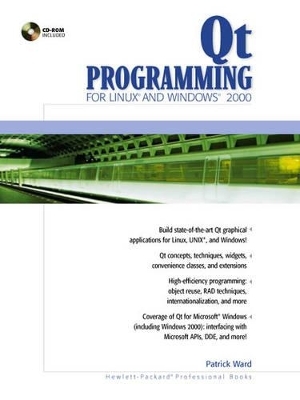
Qt Programming for LINUX and Windows 2000
Prentice Hall
978-0-13-027001-6 (ISBN)
- Titel ist leider vergriffen;
keine Neuauflage - Artikel merken
For software developers, it's the holy grail: write one state-of-the-art graphical application that runs on Linux, UNIX, and Windows. Qt 2 Programming for Linux and Windows 2000 shows experienced C++ programmers how to do just that, using the powerful new Qt 2.x toolkits -- the same tools used to build the #1 Linux graphical user interface, KDE. Start by understanding what you can do with Qt 2.x Free Edition and what requires TrollTech's Qt Professional License; and getting comfortable with the Qt Toolkit and its online documentation. Understand the key concepts that drive Qt development, starting with Qt's signal/slot mechanism, which provides an excellent framework for component-based development. Review Qt 2.x's visual objects, convenience objects, and extensions. Master powerful professional development techniques, including portability tradeoffs, interfacing with Microsoft APIs, working with DDE servers and COM/DCOM, internationalization; object reuse, and incorporating Qt in Rapid Application Development processes. There's even a full chapter on the key issues associated with Qt 2.x development for Windows 2000. The accompanying CD-ROM contains the complete Qt 2.2
Free Edition, new Qt toolkit extensions, sample code, and more.
PATRICK WARD is a member of the SDE Technologies Group at Hewlett Packard where he designs and implements mission-critical applications for Linux, HP-UX, and Windows NT. He has been working with Qt since its first release.
I. GETTING STARTED.
1. Introduction to Qt.
What the Toolkit Does. What the Toolkit Includes. Using The Qt Online Reference Documentation. Qt Portability. Microsoft Windows Logo Program. Building And Installing Qt. Qt Licensing.
2. Creating Your First Qt Applications.
Hello World Example. Contact List Interface Example. Stack vs Heap. Qt Toolkit Basics. QApplication Class. QApplication's Purposes. Color Management. QWidget Class. Parent/Child Relationship. Widget Flags. QObject Class. Signals and Slots vs Callbacks. Signal/Slot Disadvantages. Summary.
II. QT WIDGETS AND CONVENIENCE CLASSES.
3. Visual Objects.
User Interaction Objects. Buttons. Predefined Dialogs. Functional Grouping. Layout and Geometry Management. Lists, Tables, and List Items. Composite Widget Support. Text Input. Numeric Input. Scrolling. Split Panes and Tabs. Tooltips and What's This Support. Program Output Objects. Color and Palette Support. Graphic Image Output Support. Text Support. Output Widgets.
4. Qt Convenience Objects.
Events And Event Parameters. QChildEvent. QCloseEvent. QCustomEvent. QDragEnterEvent. QDragLeaveEvent. QDragMoveEvent. QDropEvent. QEvent. QFocusEvent. QHideEvent. QKeyEvent. QMouseEvent. QMoveEvent. QPaintEvent. QResizeEvent. QShowEvent. QTimerEvent. QWheelEvent. Input and Output Classes. QAccel. QAsyncIO. QBuffer. QDataStream. QDataPump. QDataSink. QDataSource. QDir. QFile. QFileInfo. QIODevice. QIODeviceSource. QTextIStream. QTextOStream. QTextStream. QSocketNotifier. Collections, Arrays, and Linked-Lists. QArray. QAsciiCache. QAsciiCacheIterator. QAsciiDict. QAsciiDictIterator. QBitArray. QByteArray. QCache. QCacheIterator. QCollection. QDict. QDictIterator. QIntCache. QIntCacheIterator. QIntDict. QIntDictIterator. QIntValidator. QList. QListIterator. QMap. QMapConstIterator. QMapIterator. QPtrDict. QPtrDictIterator. QQueue. QSortedList. QStack. QStrList and QStrIList. QStrListIterator. QStringList. QValueList. QValueListConstIterator. QValueListIterator. QValueStack. QVector. Text Handling. QChar. QClipboard. QConstString. QCString. QDoubleValidator. QRegExp. QString. QTextCodec. QTextDecoder. QTextEncoder. QTranslator. QValidator. Date and Time. QDate. QDateTime. QTime. Miscellaneous. QGuardedPtr. QMimeSource. QMimeSourceFactory. QPoint. QPointArray. QRect. QSignal. QSignalMapper. QSize. QTimer. QVariant. QWMatrix. Summary.
5. The Qt Namespace and Qt Extensions.
Qt Class. Qt Extensions. OpenGL Extension. Networking Support.
III. DEVELOPING PROFESSIONAL QT APPLICATIONS.
6. Internationalization.
Use QString. QObject::tr(). findtr Utility. msg2qm Utility. mergetr Utility. Input Methods. Summary.
7. Platform-Independent Projects.
TMAKE Utility.
8. Object Reuse Considerations.
Keep It Simple And To The Point. Always Consider Performance. Know Your Compiler. Assume Nothing. Use Slots For Exposed void-return Methods.
9. Dynamic and Static Linkage.
Big Programs. Compatibility. Possible Solutions. Configuration Management. Total Static Linkage. Mixed Static/Dynamic Linkage. Summary.
10. Debugging Projects.
Documentation and Training Bugs. User Perception Defects. Software Defects. Defect Event Capture. Core Dump Analysis (Linux/Unix only). Dr Watson (Windows only). Using A Debugger.
11. Rapid Application Development.
Qt Architect. QtEZ. KDevelope. Ebuilder.
12. Windows 2000 Topics.
DDE Server Class. Multimedia Support. Summary.
13. How To Learn More.
Appendix A.
Appendix B.
Index.
| Erscheint lt. Verlag | 20.10.2000 |
|---|---|
| Verlagsort | Upper Saddle River |
| Sprache | englisch |
| Maße | 178 x 236 mm |
| Gewicht | 615 g |
| Themenwelt | Informatik ► Betriebssysteme / Server ► Unix / Linux |
| Informatik ► Betriebssysteme / Server ► Windows | |
| Informatik ► Grafik / Design ► Digitale Bildverarbeitung | |
| ISBN-10 | 0-13-027001-6 / 0130270016 |
| ISBN-13 | 978-0-13-027001-6 / 9780130270016 |
| Zustand | Neuware |
| Informationen gemäß Produktsicherheitsverordnung (GPSR) | |
| Haben Sie eine Frage zum Produkt? |